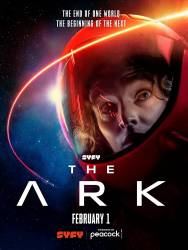Everyone Wanted to Be on This Ship - S1-E1
Other mistake: The Ark has two rotating sections. The rotation is to make simulated gravity. We see that when rotation stops, and everyone is weightless. But there is no need to rotate. The ship has artificial gravity. The bridge does not rotate, but everyone walks around just fine.
Factual error: When asked how the shuttle will move the large space ship, Alicia says, "We're in space. There's no gravity, resistance, or friction. Size doesn't matter, just force." However, Newton's second law still applies in space. F=m×a, or a=F/m. The acceleration is in direct ratio to the force and opposite ratio with the mass. In other words, given the force the shuttle's engines can apply, and the very large mass of the space ship, the acceleration the shuttle can produce is relatively small. (00:25:56)
Factual error: Alicia realizes that the asteroid is actually a comet by its tail. However, earlier in the episode we are told we are far from any star (so no point in opening the solar sails). The thing is, comets only develop a tail when they are near a star, which blows gases off the comet with the solar wind (the same wind that could operate solar sails). So in reality, there would be no tail to this comet.
We Weren't Supposed to Be Awake - S1-E4
Other mistake: Alicia puts the vials with the protein in a centrifuge, supposedly in order to mix them. When she's done, she takes a vial and shakes it to make sure it's mixed evenly. However, a centrifuge separates solutions into their ingredients, not mixes them. (00:34:00)
We Weren't Supposed to Be Awake - S1-E4
Other mistake: Alicia puts a square tray with vials into a device that looks like a small cabin. Then we see a supposedly top shot of the device, which is a centrifuge. But in the centrifuge, the vials are held in a circle, not in a square. (00:34:00)
We Weren't Supposed to Be Awake - S1-E4
Factual error: Angus rushes to the bridge to tell the officers that the crystal that contaminated the glove was made from an unknown element, that's not on the periodic table. This means the element is heavier than the heaviest known element, Oganesson. In other words, it's a superheavy element. The problem is superheavy elements have an extremely short half-life time, usually measured by the milliseconds. Anything made from this element will dissipate before or shortly after it hits the ship. (00:40:00)
Two by Two - S1-E6
Continuity mistake: When Alicia presents the slingshot trajectory, Eva says the solar sails will provide "more than enough" power to reach the planet with the U238. Shortly after the sails are deployed, the edge of one of them is damaged, causing the ship to lose enough power to start dropping back to the star. But you can see that about 1/10 of one of the six sails is damaged, or 1.7% of the entire sail array. How is "more than enough" reduced to "not enough" when they lose such a small part of the sails? (00:19:57 - 00:23:33)
Two by Two - S1-E6
Factual error: They are headed to Proxima, the closest star to Earth, but somehow use another system, a binary star, to use solar sail propulsion to get to a planet to get uranium-238. There is no closer star.
Two by Two - S1-E6
Factual error: The ship is using solar sails to accelerate. The sails are far too small to make a significant change to the speed of the ark. Also, when they approach breakaway, the ship rumbles. There is no mechanism for a transient stress. It is not like breaking the sound barrier.
Factual error: Trust called Proxima B an "eyeball" planet, meaning according to him a planet that does not spin on its own axis and always has one side facing the sun. That is incorrect. If only one side faces the sun it means the rotation on its axis and its revolution around the sun are the same.Otherwise, the planet would seasonally have all of its surface facing the sun once every solar year.





